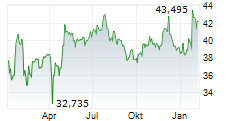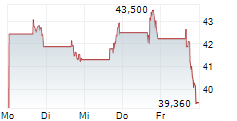
NORTHAMPTON, MA / ACCESSWIRE / April 12, 2024 / Erin Bigley, CFA| Chief Responsibility Officer
From biodiversity and blended finance to a just transition and the cost of drugs, we preview the key ESG issues we're targeting through research.
It used to seem simple. The early days of responsible investing were mainly characterized by avoidance of so-called sin stocks, such as tobacco. Since then, responsible investing has evolved into a much more sophisticated and robust understanding of the environmental, social and governance (ESG) issues affecting investment risks and opportunities. Every year seems to bring new insights, as well as new challenges for investors.
At AllianceBernstein, our research agenda aims to bring rigor and clarity to responsible investing. Below are four themes we're covering closely in 2024 through our research and partnerships. We think investors should pay close attention too.
1. The interconnectedness of all things.
Responsible investing research must take into account the complexities of relationships, not only within and across intuitively related areas of study-such as the effects of climate change on biodiversity and vice versa-but also between what have historically been viewed as the silos of E, S and G factors.
For instance, climate change is one of the most urgent challenges of our time-one that's often seen as strictly an environmental concern. But it's also a human rights issue. Neglecting to account for climate-related modern slavery threats may present material financial risks to investors.
To that end, we've recently published research in partnership with Walk Free, an international human rights group, on the intersection of climate change with modern slavery. Our work explores how physical climate risks such as typhoons and droughts make populations more vulnerable to forced migration, human trafficking, forced labor and debt bondage. It also details the tools we've developed to help investors assess, disclose and manage climate-related modern slavery risks.
Another area of focus for our ESG research-and another highly complex system that intersects with climate change and involves every kind of ecosystem service-is biodiversity. Investors are becoming increasingly aware of the importance of biodiversity and the urgency of preserving our planet's natural capital-the stock of natural resources that underpin our economy and society.
One aspect of biodiversity in particular-water-will be at the forefront of investors' minds, and ours as well, over the next few years as communities, companies and countries cope with risks around water scarcity, water pollution and sustainable water management.
Our research into biodiversity and nature-related financing aims to help investors understand, analyze and manage biodiversity risks and opportunities, as well as get a handle on investing solutions such as so-called debt-for-nature swaps.
These structures require careful evaluation but may help indebted developing countries protect their vulnerable ecosystems. Debt-for-nature swaps are a type of blended finance structure that brings together emerging-market governments, developed-market governments and private investors to lower the cost of financing for the issuer and the credit risk for the investor, and to increase the flow of capital for sustainable investment.
The United Nations Environment Programme estimates that developing countries will need up to US$366 billion annually in adaptation financing such as blended finance structures. Carbon markets, too, are becoming more universally endorsed as a critical step toward decarbonization.
2. Workforce disruption and transformation.
As responsible investing evolves to reflect real-world complexities, our understanding of social factors is also deepening. One such area of focus is transformation of the labor force. We want to understand the implications of aging demographics and deglobalization; the benefits of a more diverse and inclusive workforce; and the impact of disruptive technologies such as generative artificial intelligence (AI).
Generative AI offers tremendous opportunity for investors and for society-for how we work, study and live. But it also comes with significant social risks. For example, AI may accelerate trends in automation; as much as 30% of working hours in the US could be lost to automation by 2030. Generative AI is also an energy hog, owing to its computational power requirements. Companies that help solve this energy conundrum could enable a sustainable future for this burgeoning technology-and create opportunities for investors.
We're developing insights into how companies can navigate and leverage AI responsibly, as well as how investors can incorporate these considerations into the investment process.
Another workforce issue we're researching that could have material implications for investors involves a secular shift in the psychological contract between employers and employees, with an increased focus on worker expectations and a rise in collective actions and unionization. This shift in the balance of power between labor and capital goes hand in hand with the decline in working-age populations in many countries and the fragmentation of the labor force via deglobalization.
Lastly, diversity, equity and inclusion (DEI) is an important consideration for investors and may be a competitive advantage for companies. For instance, there's growing evidence of a positive correlation between female corporate leadership and corporate performance.
3. Emerging markets in the spotlight.
Nowhere is the intersection between environmental and social issues more prevalent than in emerging markets, which are occupying a major share of our research efforts. Take, for example, the "just transition," in which countries transition away from fossil fuels and associated greenhouse gases in a way that avoids disrupting economies and social fabrics.
This is important to investors, because a mismanaged transition may pose serious long-term credit risks for sovereign issuers-through fiscal risks, debt risk, economic deprivation, rising inequality and even potentially civil unrest. And while the just transition is a global subject, these risks are biggest for developing nations. We've developed a systematic framework for measuring and monitoring these just-transition risks.
We've also developed a framework for assessing emerging-market sovereign sustainability. From an ESG perspective, investing in sovereign emerging-market debt can feel messy. Most investors feel just familiar enough with individual countries to fall prey to subjective judgments when making comparisons. The market tends to overreact to news-good news, bad news and often both at once. And huge, complex data sets bog down analyses and muddy the view.
To solve these problems of subjectivity, reactivity and obscurity, we've identified six concrete metrics that help identify potential value and provide guidance for both emerging-market issuers and sustainable investors.
4. The health of humanity.
The COVID-19 pandemic underscored just how critical health is to the world's economy, as well as to companies and investors. In fact, poor health is estimated to cost the world US$12 trillion a year-equal to about 15% of annual global GDP. As the world's population climbs toward 10 billion by 2050, access to medicine may become even more challenged. This year, we're intensifying our research around the cost of medicine and drug pricing.
Pointing Our Research Lens Where It's Most Needed
While our current research is heavily focused on the issues we've described above, we're also still moving the needle on responsible investing classics such as physical climate risks, governance concerns, sustainable investment technology and more. We look forward to sharing our research with you throughout 2024.
The views expressed herein do not constitute research, investment advice or trade recommendations and do not necessarily represent the views of all AB portfolio-management teams. Views are subject to revision over time.
Learn more about AB's approach to responsibility here.

View additional multimedia and more ESG storytelling from AllianceBernstein on 3blmedia.com.
Contact Info:
Spokesperson: AllianceBernstein
Website: https://www.3blmedia.com/profiles/alliancebernstein
Email: info@3blmedia.com
SOURCE: AllianceBernstein
View the original press release on accesswire.com




